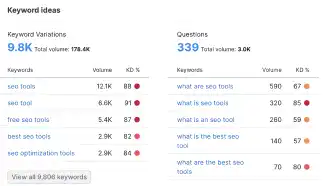Keyword Research: Defining Keyword Demand and Competition

In the bustling world of digital marketing, keyword research is essential for any website aiming to attract traffic and improve its visibility. Here, we explore the nuances of keyword demand and competition, helping you strategically approach keyword research to maximize the return on your SEO investments.
Understanding the Landscape of Keyword Competition
The internet is saturated with websites competing for attention. Popular keywords, which are terms that generate significant traffic, are typically highly competitive. High competition in keywords means that many established websites with strong domain and page authority are already ranking for these terms. As a result, for a new website, trying to rank for these keywords can be an uphill battle.
For example, if a search for potential target keywords shows that the top 10 search results are dominated by pages from high-authority domains, it’s unlikely that a new site could easily break into these ranks without considerable effort and time. These established sites have likely invested years and substantial resources to secure their positions at the top of the search engine results pages (SERPs).
The Dilemma of Low Competition Keywords
On the flip side, keywords with lower competition typically have less search volume, which might translate to fewer opportunities to draw traffic to your site. Targeting such keywords could mean that even if you rank well, the overall impact on your site's traffic could be minimal. This presents a dilemma for website owners and SEO strategists: should you compete in a crowded market with high rewards or settle for easier wins with less traffic?
Two Critical Data Points for Keyword Research
Effective keyword research solves this conundrum. You can develop a balanced keyword strategy by understanding the demand (search volume) and competition (keyword difficulty) of potential keywords. This strategy aims to find a middle ground—keywords that have sufficient search volume but are not too competitive to rank for, providing a feasible path to improving your website’s visibility and traffic.
Monthly Search Volume
Monthly search volume represents the total number of searches that a specific keyword receives in a month. It's important to note that this metric does not indicate the number of unique users or the clicks a keyword receives but merely the frequency of searches. This metric is crucial as it helps gauge the potential traffic a keyword can bring if ranked successfully.
Keyword difficulty
Keyword difficulty (KD), often measured on a scale from 0 to 100, assesses how challenging it would be to rank for a particular keyword in the SERPs. A higher KD score indicates a higher competition level, making it tougher to achieve a top-ranking position. Tools like Semrush or Ahrefs provide these metrics, offering insights into the competitive landscape of keywords.
Here is an example of Monthly Search Volume and Keyword difficulty from Semrush.

Practical Tips in Keyword Research
- Identify Your Niche: Start by understanding the core topics relevant to your website. This focus helps in pinpointing keywords that are not just popular but are also integral to your specific audience.
- Use Keyword Research Tools: Leverage tools like Semrush, Ahrefs, or Google Keyword Planner to gather data on keyword volume and difficulty. These tools can also suggest related keywords that might offer more accessible opportunities.
- Analyze the Competition: Look at who currently ranks for your chosen keywords. Study their content and SEO strategies. This analysis can provide insights into what it may take to outrank them.
- Select Balanced Keywords: Aim for keywords that strike a balance between decent search volume and lower competition. These are your "low-hanging fruits" that can yield results without the need for massive SEO campaigns.
- Refine and Iterate: Keyword trends can change, and so can search engine algorithms. Continuously monitor the performance of your targeted keywords and adjust your strategy as needed.
Keyword research is not just about finding words with high search volumes; it’s about understanding the competitive landscape and strategically selecting keywords that offer the best chance for success. By analyzing keyword demand and competition effectively, you can set a more informed and effective SEO strategy that aligns with your business goals and audience needs.
This balanced keyword research approach can help you increase your website's visibility, attract more relevant traffic, and achieve a higher ROI from your SEO efforts. Remember, the goal of keyword research is to uncover opportunities that are not just about traffic but also about reaching the right audience for your content and services.




